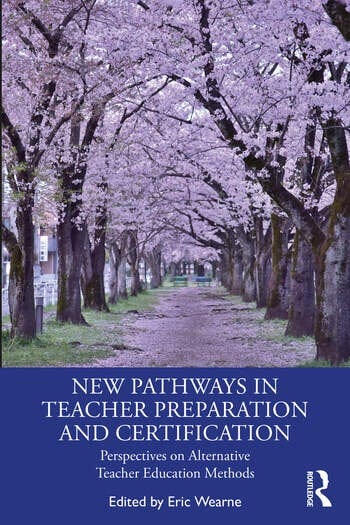
I have had a lighter posting schedule lately in part because of summertime, and in part because I have been in the late stages of a project I am really excited to mention here.
I’ve spent a lot of time with hybrid schools, private and charter schools, microschools, etc, too, with many philosophies and approaches. But even before I started working with hybrid schools, I was a professor in a conventional teacher prep program. I spent years in conventional teacher prep. Some good people there. Different kinds of schools seek many different kinds of teachers.
So many different kind of schools exist, but we tend to prepare and certify teachers for almost all of them through the same methods and channels. What if we really believed that teachers mattered? What if we prepared them for the actual schools they were going to work in?
With those questions in mind, I had a great time thinking about teacher prep and asking others about it to put this book together. And asking some of the many currently existing groups who prepare teachers totally outside of the conventional pathways to talk about how they do it.
All of that turned into our book: New Pathways in Teacher Preparation and Certification Perspectives on Alternative Teacher Education Methods, which will come out in November. I will do some more in-depth posts about particular issues people explore in the book over the coming months, or things that we touch on but that could use even more exploration. For now I just want to introduce the absolute murderer’s row of contributors who agreed to be in the lineup for New Pathways and to give just a quick preview of their work in the book.
What are we missing out on by not purpose designing teacher prep programs? By not finding the best teachers and learning from them? Why not make the best ones famous? In his chapter, Michael Strong talks about what great things we could have, if we just chose to.
Everybody hates the "one best system" approach to education, but that's largely what we do to teacher prep! Why do teacher preparation programs always end up converging on the same methods, the same policies, the same worldviews? There are reasons institutions of all kinds evolve this way, and teacher prep is no different, as Lindsey Burke explains in her chapter on institutional isomorphism.
What are the practical implications for schools when we have such a strict teacher certification/licensure regime? We know a lot about issues that come from occupational licensing. Ben Scafidi writes about this in his chapter on teacher prep economics and politics.
Classical education operates from some different basic assumptions compared to conventional education. The CiRCE Apprenticeship helps prepare teachers in that tradition, mentoring teachers with skills needed in those environments.
What if a person only ever wants to be an online teacher? This is an increasingly common choice for new teachers. They might get some tips in a conventional teacher prep program. Instead we could plan for that career path from the start.
The Montessori and Charlotte Mason methods have both been around for a century at least, and teachers in such schools have particular needs. Luckily both have traditions of preparing teachers to be successful their schools. The Montessori program at the University of Hartford and Ambleside Schools International were both kind enough to provide chapters about their work.
There are lots of new kinds of microschools popping up and the job of "teacher" in these schools often looks really unique. Prenda guides, for example, approach things differently from conventional teachers, and operate in environments that look very different from conventional classrooms, and their approach is included in our book.
What about low cost schools in other nations, which serve huge percentages of students there? People are working on how to serve teachers there too, as David Longfield and Andreea Dogar explain in their chapter on the University of Buckingham’s Teacher Training Program.
The book comes out in November! I hope you will read it and consider what we can do (and are already doing) to improve teacher prep for schools of all kinds, all over the US (and elsewhere). If you think teacher prep is important but could be better: alternatives already exist. And we can create more.



